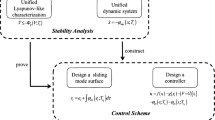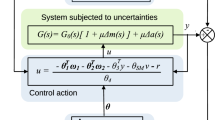Abstract
In this paper, a novel model-dependent scheduling scheme is proposed for the networked control systems with time-delay, disturbance, and medium access constraints. The scheduler calculates the error between the ideal dynamic and the real system, and selects the states that make the stability of the system better to access the network. In addition, two kinds of representative time-delays in the networked control systems, constant time-delay and random time-delay, are considered. A robust H-infinity and switched-system-based co-design strategy is introduced to deal with the disturbance in the system, and the system uncertainty introduced by the random time-delay as well. Finally, illustrative examples are given to demonstrate the effectivity of the proposed scheduling method and the co-design scheme.
Similar content being viewed by others
References
J. P. Hespanha, P. Naghshtabrizi, and Y. Xu, “A survey of recent results in networked control systems,” Proceedings of the IEEE, vol. 95, no. 1, pp. 138–162, January 2007.
X. Ge, F. Yang, and Q. L. Han, “Distributed networked control systems: A brief overview,” Information Sciences, vol. 380, pp. 117–131. February 2017.
D. Zhang, P. Shi, Q. G. Wang, and L. Yu, “Analysis and synthesis of networked control systems: A survey of recent advances and challenges,” ISA Transactions, vol. 66, pp. 376–392, January 2017.
Z. Gu, D. Yue, C. Peng, J. L. Liu, and J. H. Zhang, “Fault tolerant control for systems with interval time-varying delay and actuator saturation,” Journal of the Franklin Institute, vol. 350, no. 2, pp. 231–243, March 2013.
A. Elahi and A. Alfi, “Finite-time ℌ∞ control of uncertain networked control systems with randomly varying communication delays,” ISA Transactions, vol. 69, pp. 65–88, July 2017.
H. Liu, P. Shi, H. R. Karimi, and M. Chadli, “Finite-time stability and stabilisation for a class of nonlinear systems with time-varying delay,” International Journal of Systems Science, vol. 47, no. 6, pp. 1433–1444, April 2016.
A. Elahi and A. Alfi, “Finite-time ℌ∞ stability analysis of uncertain network-based control systems under random packet dropout and varying network delay,” Nonlinear Dynamics, vol. 91, no. 1, pp. 713–731, January 2018.
H. J. Yang, X. D. Guo, L. Dai, and Y. Q. Xia, “Event-triggered predictive control for networked control systems with network-induced delays and packet dropouts,” International Journal of Robust and Nonlinear Control, vol. 28, no. 4, pp. 1350–1365, March 2018.
Y. Li, G. P. Liu, S. L. Sun, and C. Tao, “Prediction-based approach to finite-time stabilization of networked control systems with time delays and data packet dropouts,” Neurocomputing, vol. 329, pp. 320–328, February 2019.
C. de Persis and P. Tesi, “A comparison among deterministic packet-dropouts models in networked control systems,” IEEE Control Systems Letters, vol. 2, no. 1, pp. 109–114, October 2018.
S. Aouaouda and M. Chadli, “Robust fault tolerant controller design for Takagi-Sugeno systems under input saturation,” International Journal of Systems Science, vol. 50, no. 6, pp. 1163–1178, April 2019.
M. Rehan, M. Tufail, C. K. Ahn, and M. Chadli, “Stabilisation of locally Lipschitz non-linear systems under input saturation and quantisation,” IET Control Theory & Applications, vol. 11, no. 9, pp. 1459–1466, June 2017.
R. R. Wang, H. Jing, J. X. Wang, M. Chadli, and N. Chen, “Robust output-feedback based vehicle lateral motion control considering network-induced delay and tire force saturation,” Neurocomputing, vol. 214, pp. 409–419, November 2016.
H. F. Chen, J. F. Gao, T. Shi, and R. Q. Lu, “ℌ∞ control for networked control systems with time delay, data packet dropout and disorder,” Neurocomputing, vol. 179, pp. 211–218, February 2016.
A. Cuenca, D. J. Antunes, A. Castillo, G. Pedro, B. A. Khashooei, and W. P. M. H. Heemels, “Periodic event-triggered sampling and dual-rate control for a wireless networked control system with applications to UAVs,” IEEE Trans. on Industrial Electronics, vol. 66, no. 4, pp. 3157–3166, April 2019.
J. K. Sun, J. Yang, S. H. Li, and W. X. Zhang, “Sampled-data-based event-triggered active disturbance rejection control for disturbed systems in networked environment,” IEEE Trans. on Cybernetics, vol. 49, no. 2, pp. 556–566, February 2017.
Y. J. Shen, F. J. Li, D. Y. Zhang, Y. W. Wang, and Y. G. Liu, “Event-triggered output feedback ℌ∞ control for networked control systems,” International Journal of Robust and Nonlinear Control, vol. 29, no. 4, pp. 166–179, October 2019.
C. Peng, M. Wu, X. P. Xie, and Y. L. Wang, “Event-triggered predictive control for networked nonlinear systems with imperfect premise matching,” IEEE Trans. on Fuzzy Systems, vol. 26, no. 5, pp. 2797–2806, October 2018.
S. X. Wen and G. Guo, “Static-dynamic hybrid communication scheduling and control co-design for networked control systems,” ISA Transactions, vol. 71, pp. 553–562, November 2017.
W. Chen, J. Yao, and L. Qiu, “Networked stabilization of multi-input systems over shared channels with scheduling/control co-design,” Automatica, vol. 99, pp. 188–194, January 2019.
W. Wu and Y. Zhang, “Event-triggered fault-tolerant control and scheduling codesign for nonlinear networked control systems with medium-access constraint and packet disordering,” International Journal of Robust and Nonlinear Control, vol. 28, no. 4, pp. 1182–1198, March 2018.
G. Guo, “Linear systems with medium-access constraint and Markov actuator assignment,” IEEE Trans. on Circuits and Systems I: Regular Papers, vol. 57, no. 11, pp. 2999–3010, November 2010.
A. Cervin, J. Eker, B. Bernhardsson, and K. E. Arzen, “Feedback-feedforward scheduling of control tasks,” Realtime Systems, vol. 23, no. 1–2, pp. 25–53, July 2002.
L. Sha, R. Rajkumar, and J. P. Lehoczky, “Priority inheritance protocols: An approach to real-time synchronization,” IEEE Trans. on Computers, vol. 39, no. 9, pp. 1175–1185, September 1990.
T. P. Baker, “Stack-based scheduling of realtime processes,” Real-time Systems, vol. 3, no. 1, pp. 67–99, March 1991.
R. Brockett, “Stabilization of motor networks,” Proc. of the 34th IEEE Conf. Decision and Control, pp. 13–15, 1995.
H. Rehbinder and M. Sanfridson, “Scheduling of a limited communication channel for optimal control,” Automatica, vol. 40, pp. 491–500, March 2004.
S. X. Wen, G. Guo, and Z. H. Li, “Binary sequence based dynamic scheduling and control co-design for cyber-physical systems,” Proc. of the 35th Chinese Control Conference, pp. 27–29, 2016.
G. C. Walsh, H. Ye, and L. G. Bushnell, “Stability analysis of networked control systems,” IEEE Trans. on Control Systems Technology, vol. 10, no. 3, pp. 438–446, August 2002.
S. X. Wen and G. Guo, “Minimum data rate for exponential stability of networked control systems with medium access constraints,” International Journal of Control, Automation and Systems, vol. 6, no. 2, pp. 717–725, April 2018.
C. Zhou, H. Lu, J. Ren, and Q. W. Chen, “Co-design of dynamic scheduling and quantized control for networked control systems,” Journal of the Franklin Institute, vol. 352, no. 10, pp. 3988–4003, October 2015.
T. Wang, C. Zhou, H. Lu, J. D. He, and J. Guo, “Hybrid scheduling and quantized output feedback control for networked control systems,” International Journal of Control, Automation and Systems, vol. 16, no. 1, pp. 197–206, February 2018.
S. L. Zhao and Y. H. Ji, “Co-design of model-reference scheduling and control,” Proc. of the 37th Chinese Control Conference, pp. 6465–6468, 2018.
M. Trivellato and N. Benvenuto, “State control in networked control systems under packet drops and limited transmission bandwidth,” IEEE Trans. on Communication, vol. 58, no. 2, pp. 611–622, February 2010.
Y. Niu, Y. L. Liang, and H. Z. Yang, “Event-triggered robust control and dynamic scheduling co-design for networked control system,” Proc. of the 14th International Bhurban Conf. on Applied Sciences and Technology, pp. 237–243, 2017.
W. G. Ma and C. Shao, “Stochastic stability for networked control systems,” Acta Automatica Sinica, vol. 33, no. 8, pp. 878–882, August 2007.
S. Boyd and L. Vandenberghe, Convex Optimization, Cambridge University Press, Cambridge, 2004.
V. Kolmanovskii and A. Myshkis, Applied Theory of Functional Differential Equations, Kluwer Academic Publisher, Boston, 1992.
Author information
Authors and Affiliations
Corresponding author
Additional information
Publisher’s Note Springer Nature remains neutral with regard to jurisdictional claims in published maps and institutional affiliations.
Recommended by Associate Editor M. Chadli under the direction of Editor Yoshito Ohta. This work is supported by Natural Science Foundation of Tianjin, grant number 18JCQNJC74600; National Natural Science Foundation of China, grant number 61603274; Research Project of Tianjin Municipal Education Commission, grant number 2017KJ249; Open Fund of Tianjin Key Laboratory for Control Theory & Applications in Complicated System, grant number TJKL-CTACS-201704.
Shunli Zhao received his Ph.D. degree from Beijing Jiao University in 2016. And now, he is a lecturer in Tianjin University of Technology, China. His research interests include networked control systems, game theory, and artificial intelligence.
Yuehui Ji received her Ph.D. degree from Tianjin University, China in 2012. She is currently working as a lecturer in School of Electrical and Electronic Engineering, Tianjin University of Technology, China. Her research interests include nonlinear adaptive control, containment control for multi-agent systems.
Rights and permissions
About this article
Cite this article
Zhao, S., Ji, Y. Model-dependent Scheduling and H-infinity Control Co-design for Networked Control Systems. Int. J. Control Autom. Syst. 19, 969–979 (2021). https://doi.org/10.1007/s12555-019-0177-3
Received:
Revised:
Accepted:
Published:
Issue Date:
DOI: https://doi.org/10.1007/s12555-019-0177-3




